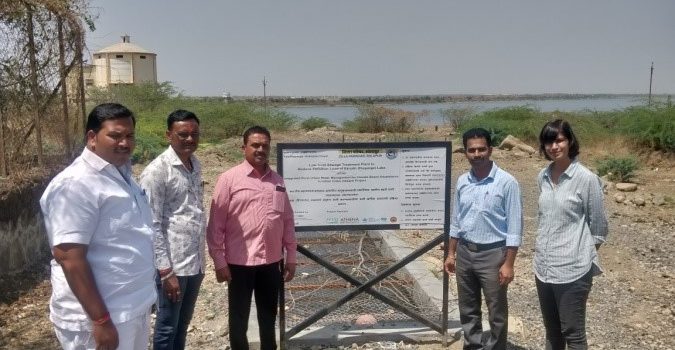Pilot Initiatives under IAdapt Project introduce innovative ways for water management

Under the Integrated Rural Urban Water Management for Climate Based Adaptations in Indian Cities project, two pilot initiatives have been undertaken in a micro-catchment of Solapur city in India.
While one looks at safeguarding the common water resource of a lake in the rural area through bio-remediation of waste water flowing in, the other looks at reducing urban water demand by using roof top rain water harvesting in municipal schools.
The pilot project on rooftop rainwater harvesting assessed the potential of roof top rain water harvesting for ground water recharge for 25 Solapur Municipal Corporation (SMC) buildings, and implemented roof top rain water harvesting for ground water recharge at one municipal school complex in Solapur. This would provide alternate water resources as an immediate remedy to reduce the stress on existing water resources.
Through the project, about 58% of the total annual water demand of the selected schools is being recharged. It is envisaged that this will result in greater access to quality water for the students, and lead to improved health and hygiene for students. Future climate challenges of greater demand of water can also be addressed by recharging the ground water and reducing dependence on shared sources.
This project will also be used to conduct awareness activities and promote rain water harvesting for ground water recharge.
The other project on low cost wastewater treatment plant using constructed wetland systems at Talehipparga village, has helped to treat waste water entering into the Ekrukh (Hipparga) Lake from village Tale Hipparga at Solapur.
Due to close proximity of the water resource, availability of land and considering local ecosystem it was proposed to install a bio-remediation based constructed wetland system in which local plant species would be used to consume nutrients from the wastewater. The treated wastewater could be used for irrigation or discharged in the lake. The constructed wetland is a low cost, low maintenance and replicable waste water treatment system for treatment of sewage from villages and reducing the pollution of the lake water.
Both these pilot projects are contributing to the goal of integrated water management through different approaches – demand side management and supply side resource protection respectively.



